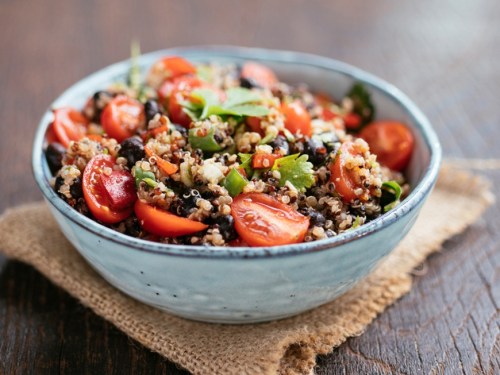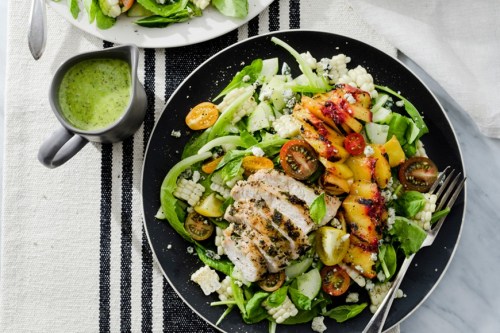Our editors independently select these products. Making a purchase through our links may earn Well+Good a commission
When it comes to meatless eating, veganism—eschewing animal products of all kind, including eggs, fish, and honey—has earned a rep for being the strictest plan. But if you follow food bloggers and health-focused sites, you’ll notice that another label has been popping up with increasing frequency: plant-based.
Years ago, if a recipe called for alt-milk instead of dairy and coconut oil instead of butter, it was labeled a vegan recipe. Now, it’s just as likely to be called plant-based—even if it checks all the vegan boxes. So, what’s the difference? And why are some people choosing to distance themselves from the vegan title?
Years ago, if a recipe called for alt-milk instead of dairy and coconut oil instead of butter, it was labeled a vegan recipe. Now, it’s just as likely to be called plant-based.
“Vegans are pretty hard-core,” says Whitney Scott, a health coach who specializes in creating vegan meal plans for touring musicians. She points out that besides food, vegans often have strong opinions on leather, fur, and other lifestyle choices. But the differences between vegan and plant-based eating don’t stop there.
Here, Scott, along with Plantlab chef Leslie Durso and Genius Foods author Max Lugavere, get into the nitty-gritty distinctions between these two popular ways of eating—and reveal which one is really healthier.
Keep reading to find out the difference between vegan and plant-based eating plans.

The nuanced distinction between vegan and plant-based diets
“Here’s what I’ve found with veganism,” Scott starts. “You see a lot of people still thinking that processed food is okay. You can be a vegan and subsist off of processed foods if you want to.” Just think of the vegan pizzas made with “cheese-substitute” (not nut-based cheese) that fill the frozen foods aisle. “But with a plant-based diet, it’s more about a whole foods approach,” wherein you’re more mindful of the processed foods you eat, she says. Because of this, Scott (who is a vegan herself, largely for animal rights reasons) says plant-based is the healthier diet.
What’s most important is being able to know exactly what you’re putting into your body, so being able to read a label is key.
Still, there are gray areas, like the “bleeding burgers” that taste scarily close to the real thing but may contain some questionable ingredients. “I think when science and nature can converge and make something, that’s really great. But ultimately, are we messing with nature? I have my own questions,” says Scott. To her, what’s most important is being able to know exactly what you’re putting into your body, so being able to read a label is key. And if you can’t do that with a meat substitute product, she isn’t into it.
Durso agrees. “I don’t believe in restricting yourself to rules when you’re eating, but you should keep in mind to eat real food,” she says. “The more whole foods and less processed ingredients, the better you’ll feel.”

The case for a side of meat
“It’s possible to have a diet based around plants while also incorporating animal products, and I actually think that’s the best diet to eat,” Lugavere says. He says when you look at the science of nutrition, eating a variety of plants is important to keep the good bacteria in the gut thriving, but when it comes to brain health, you need nutrients from both plants and animals. “There isn’t a researcher out there arguing that our brains evolved from a vegan diet,” he says.
Lugavere calls out a study performed by researchers at UCLA that found that children on a vegan diet experienced slower brain growth than children who had meat and dairy in their diet, even though they were consuming the same amount of calories. “The nutrients from animals are really important, not only for the developing brain but we now know that our brains continue to change throughout life, which is called neuroplasticity, and we need certain nutrients to keep the brain cells functioning properly,” Lugavere says.
Still, Lugavere maintains that it’s important to eat animal products that are ethically sourced: Grain-fed, factory-based meat is not as good for you as grass-fed, antibiotic-free meat, he says. And you don’t need to eat that much meat to reap the benefits; just a palm-sized amount once a day.
That said, there are ways to stick to a vegan lifestyle and get the nutrients you need—you’re just going to be popping more supplements than your animal-product-eating counterparts (vegan supplemental must-haves: omega-3 fatty acid, vitamin D, vitamin B12, zinc, and iron). Which is important to note, because you always want to feel good about what you’re putting in your body, whether you’re making your choices for nutritional or ethical reasons.
If you’re vegan and not turning back, these go-to recipes will save you on busy weeknights. Plus, five surprising plant-based protein power sources.
Sign Up for Our Daily Newsletter
Get all the latest in wellness, trends, food, fitness, beauty, and more delivered right to your inbox.
Got it, you've been added to our email list.










